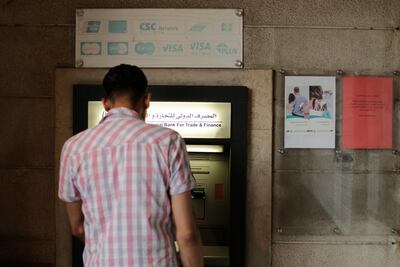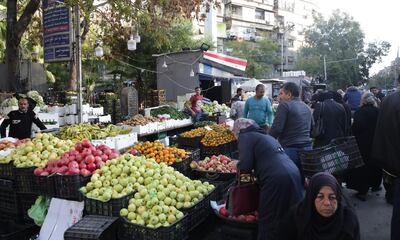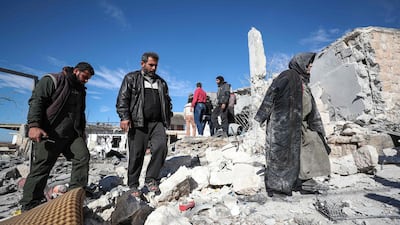There is never any respite for Syria’s civilians. When they are not dodging bombs and artillery, and risking starvation in sieges, or daily indignities in refugee camps, they are struggling with poverty, endemic corruption and an economic crisis that has left them battered and exhausted in their fight to survive a nine-year conflagration.
The latest economic crisis hinges on the collapse of the national currency. The Syrian pound fell to an all-time low this week, plunging to 950 Syrian pounds to the US dollar, after hovering at about 47 Syrian pounds to the dollar in 2011 before the uprising began.
The collapse has structural causes, of course. Syria’s economy is in tatters and has little chance of recovering under ongoing economic sanctions and no reconstruction aid, despite the military victory of Bashar Al Assad’s regime in the war. The tourism sector and oil and agricultural exports are at a standstill.
However, this crisis has been exacerbated by the ongoing revolution in neighbouring Lebanon. Protests against that country's entrenched, corrupt political elite have brought its economy and banking sector to a standstill. Banks have barred foreign transfers due to a shortage of dollars, which has had a ripple effect on Syria as well. Syrians who entrusted Lebanese banks with their life savings now have to worry, on top of putting food on the table for their families in a war-battered country, that a possible banking collapse will do away with their hard-earned savings.
What does this mean for ordinary Syrians still living in the country, having survived nearly nine years of relentless violence? Simply this: more misery.

The collapse of the national currency has contributed to worsening inflation. Syrians are already struggling – two-thirds live in extreme poverty, more than half the population is thought to be unemployed and GDP has fallen by two-thirds since the start of the war. Industrial and commercial powerhouses in places such as Aleppo have been left in ruins.
Now ordinary Syrians will not be able to afford basic necessities such as food staples or fuel to power heaters in the dead of winter. So much has been sacrificed to keep Mr Al Assad in power. Half a million have died and half the country is displaced. But now what remains of his state is incapable of providing even the most basic necessities for a traumatised people.
This is an untenable situation.
Mr Al Assad has militarily won the war. Backed by Iran and Russia, he has methodically clawed back much of the country from disorganised and defeated rebels. But what comes after the guns have fallen silent? What is victory if it only leads to greater discontent?
The staggering loss of life, destruction and displacement in Syria is all the more soul-crushing because none of the elemental reasons for why civilians bravely marched in the streets in 2011 have been addressed, none of their aspirations realised. The regime's victory and the unwavering support of its backers has meant that it can continue its repressive policies of arbitrary detention, untrammeled power with the intelligence agencies and unbridled violence in its pursuit of military domination.
However, the indignities visited by Mr Al Assad's police state are only compounded by its economic failings and the subsequent destitution of Syria's citizens. It is a tinderbox that threatens to explode at any moment. The government's mismanagement, as well as the corruption that has flourished in wartime and enriched the business elite and war profiteers, will drive the next wave of discontent and unrest. Right now, it feels like the government and its patrons are simply rearranging the decks on the Titanic.

There is, of course, another way. Arab and western countries have so far withheld reconstruction aid, of which hundreds of billions of dollars may be needed, without a clear political plan to resolve the conflict. That goes some way to addressing festering issues such as the tens of thousands of detainees in regime dungeons. Similarly, sanctions imposed by the European Union are unlikely to be lifted without genuine political reforms.
One possible avenue for these reforms could lie in the constitutional committee, which has begun deliberations meant to lead to a new post-war charter for Syria. These debates, if done properly, could finally allow Syrian grassroots activists and civil-society members, as well as proponents and opponents of the regime, to wrestle with fundamental questions of the country's identity and future and attempt to build a tenuous peace between warring communities.
The regime, whose waiting game has been key to its survival, has not shown a desire to compromise on the constitutional committee or any other avenue where tough concessions are to be made, seeing no reason to yield any of its gains. But it might not have a choice if its economic woes persist.
And what of the ordinary men and women whose lives are hanging by a thread, impoverished and desperate for any respite from their woes? They will go cold and hungry again this winter, their future uncertain, their savings precarious, their lives on hold. All so one man can stay on his throne.
Kareem Shaheen is a former Middle East correspondent, now in Canada


